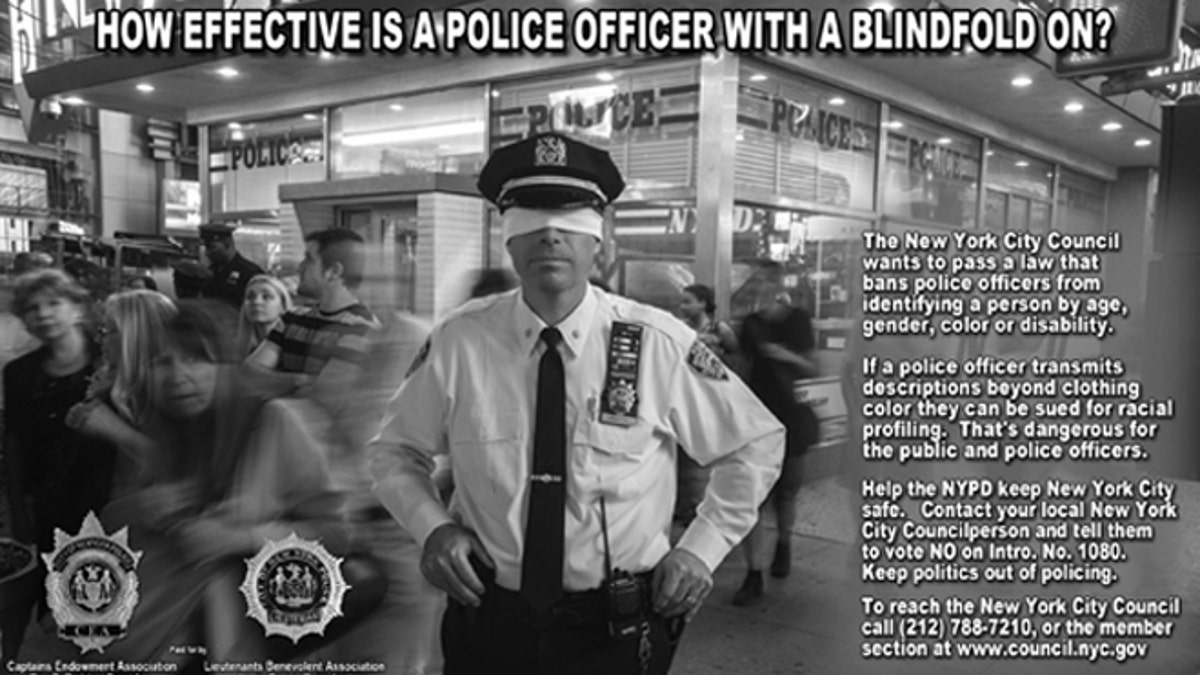
Shown here is an ad from New York City police unions opposing a new proposal they say will limit their ability to do their jobs. (Captains Endowment Association of the NYPD/Lieutenants Benevolent Association)
Police unions in New York City are blasting a piece of legislation they say will handcuff them, by preventing cops from using little more than the color of a suspect’s clothing in descriptions or risk being sued for profiling.
A half-page ad in Thursday’s New York Post paid by the NYPD Captains Endowment Association and the Lieutenants Benevolent Association asks: “How effective is a police officer with a blindfold on?”
The answer is not very, according to Roy Richter, president of the Captains Endowment Association who is seen in the advertisement wearing a blindfold in bustling Times Square. Richter claims Intro. No. 1080 would send crime rates soaring and told The Post the bill is dangerous because it will “ban cops” from identifying a suspect’s age, gender, color or disability.
The proposal, sponsored by Jumaane Williams, D-Brooklyn, would effectively expand the definition of profiling, which is already prohibited. It specifically pertains to what factors officers can consider before stopping a potential suspect.
The bill defines profiling as "an act of a member of the force of the police department or other law enforcement officer that relies on actual or perceived race, [ethnicity, religion or] national origin, color, creed, age, alienage or citizenship status, gender, sexual orientation, disability, or housing status as the determinative factor in initiating law enforcement action against an individual, rather than an individual's behavior or other information or circumstances that links a person or persons [of a particular race, ethnicity, religion national origin] to suspected unlawful activity.”
Thursday’s ad urges residents to contact local councilmembers to urge them to vote against the bill. City Council Speaker Christine Quinn is reportedly going to bypass normal committee processes to bring the measure directly to a vote.
“If a police officer transmits descriptions beyond clothing color they can be sued for racial profiling,” Thursday’s ad reads. “That’s dangerous for the public and police officers.”
City councilmembers, according to the bill, have “deep” concerns regarding the impact of the NYPD’s growing reliance on stop-and-frisk tactics, and particularly the impact of the practice on communities of color.
“In 2002, the NYPD made approximately 97,000 stops,” the bill reads. “By 2010, the number of stops had increased to more than 601,000. Black and Latino New Yorkers face the brunt of this practice and consistently represent more than 80 percent of people stopped despite representing just over 50 percent of the city's population.”
Stop-and-frisk practices, further, have not increased public safety, sponsors claim, as year-after-year nearly 90 percent of individuals stopped are neither arrested nor issued a summons.
NYPD Detectives Endowment Association President Michael Palladino criticized Quinn for supporting the rare expedited process and said his union plans to place ads in newspapers next week.
“The (union’s) ad will focus on . . . Speaker Quinn’s political decision to sell the security of all New Yorkers for votes,” Palladino told the newspaper. “Where was the speaker and her legislation for the last seven years?”
A spokeswoman for Quinn said the proposal was sent to a full vote because a majority of councilmembers supported it and Public Safety Committee chair Peter Vallone Jr., who opposes the measure, refused to let it out of committee.
Patrolmen's Benevolent Association President Pat Lynch said the “so-called biased policing” package was a misnomer.
“Rather than focus on unnecessary laws, the council should be supporting its police officers — not attacking them,” he said. “Racial profiling is already illegal — and should be.”
Williams and fellow Brooklyn Democrat Brad Lander, a co-sponsor of the proposal, told the Post the bill, if passed, would only expand the city’s existing racial-profiling law by adding other demographic groups that should be protected, such as homeless and homosexual individuals.
Lander told CBS New York that police union officials are mischaracterizing the bill.
“They know they’re misrepresenting the legislation,” Lander told the station. “Police officers will continue to be able to use skin color and gender and age and height in suspect descriptions. What doesn’t work is profiling people based solely on they’re being one race, being one religion, being gay, living in public housing.”











































